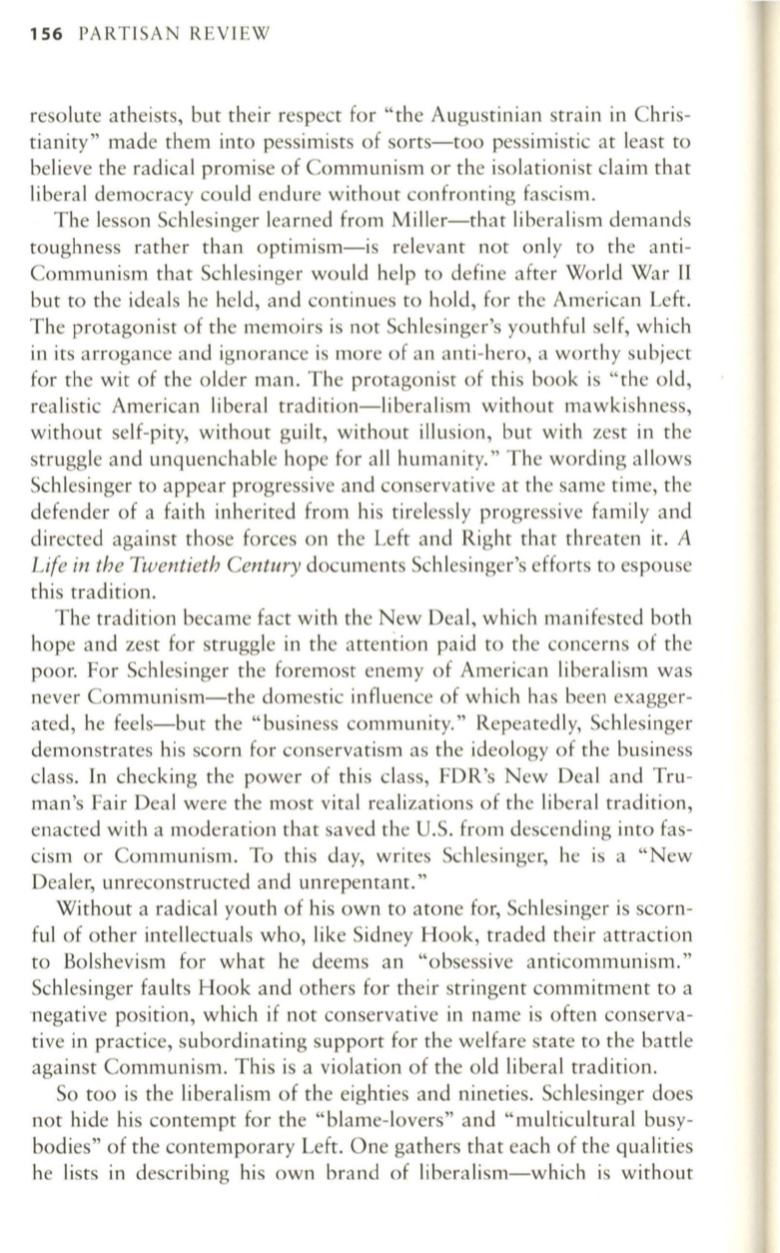
156
PARTISAN REVIEW
resolute atheists, but their respect for "the Augustinian strain in Chris–
tianity" made them into pessimists of sorts-too pessimistic at least to
believe the radical promise of Communism or the isolationist claim that
liberal democracy could endure without confronting fascism.
The lesson Schlesinger learned from Miller-that liberalism demands
toughness rather than optimism-is relevant not only to the anti–
Communism that Schlesinger would help to define after World War II
but to the ideals he held, and continues to hold, for the American Left.
The protagonist of the memoirs is not Schlesinger'S youthful self, which
in its arrogance and ignorance is more of an anti-hero, a worthy subject
for the wit of the older man. The protagonist of this book is "the old,
realistic American liberal tradition-liberalism without mawkishness,
without self-pity, without guilt, without illusion, but with zest in the
struggle and unquenchable hope for all humanity." The wording allows
Schlesinger to appear progressive and conservative at the same time, the
defender of a faith inherited from his tirelessly progressive family and
directed against those forces on the Left and Right that threaten it.
A
Life in the Twentieth Century
documents Schlesinger'S efforts to espouse
this tradition.
The tradition became fact with the New Deal, which manifested both
hope and zest for struggle in the attention paid to the concerns of the
poor. For Schlesinger the foremost enemy of American liberalism was
never Communism-the domestic influence of which has been exagger–
ated, he feels-but the "business community." Repeatedly, Schlesinger
demonstrates his scorn for conservatism as the ideology of the business
class.
In
checking the power of this class, FDR's New Deal and Tru–
man's Fair Deal were the most vital realizations of the liberal tradition,
enacted with a moderation that saved the U.S. from descending into fas–
cism or Communism. To this day, writes Schlesinger, he is a "New
Dealer, unreconstructed and unrepentant."
Without a radical youth of his own to atone for, Sch lesinger is scorn–
ful of other intellectuals who, like Sidney Hook, traded their attraction
to Bolshevism for what he deems an "obsessive anticommunism."
Schlesinger faults Hook and others for their stringent commitment to a
·negative position, which if not conservative in name is often conserva–
tive in practice, subordinating support for the welfare state to the battle
against Communism. This is a violation of the old liberal tradition.
So too is the liberalism of the eighties and nineties. Schlesinger does
not hide his contempt for the "blame-lovers" and "multicultura l busy–
bodies" of the contemporary Left. One gathers that each of the qualities
he lists in describing his own brand of libera lism-which is without


